Guild Wars 2 preview
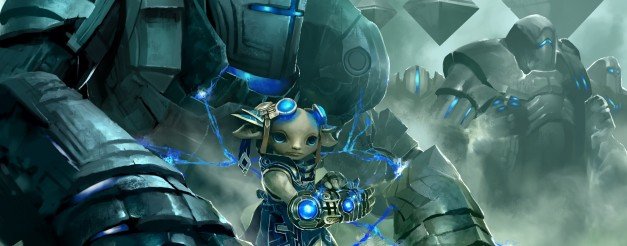
Art director Daniel Dociu is talking me through a flyby of a new prototype area in Guild Wars 2. We're hunched around the monitor of an artist as he drives the camera across a stunning azure port. Merchants, tables, chairs and bunting line the wooden walkways. The water beneath the jetties ripples and gleams. Above it all is a giant brass globe, across which sheets of electrical energy crackle. It is gorgeous.
“This is where we let our novice artists learn our methods.”
It's hard to tear my eyes away from the screen. This prototype port is one of the most beautiful fake places I've ever seen. My eyes settle on an animator quietly working away at the far side of the room. He's working on a flag, ensuring that it ripples and flaps in the wind. This prototype flag is one of the most beautiful pieces of fake heraldry I've ever seen. I look away again, and my gaze settles on a texture artist who is carefully scratching and damaging a chest of drawers, ensuring the grain in the wood is just so. This fake chest of drawers is... You get the picture.
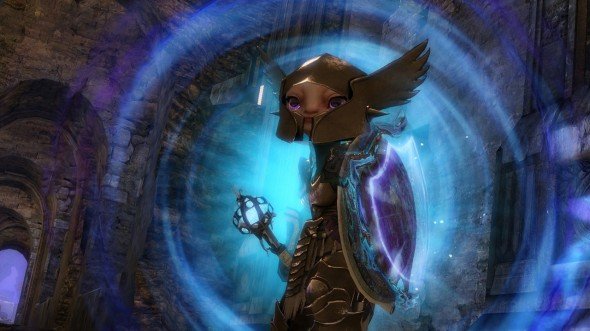
If nothing else, Guild Wars 2 will be a beautiful fantasy MMORPG. Better than that, having played it, I can say that I think it's a step forward for MMO games. Guild Wars 2 is advancing the very fundamentals of the genre. It is bravely ditching the fetch, carry, kill and collect style of questing that has kept us entertained/ sedated for years. It is pinning its second-by-second interactions on a combat style that is fast, frantic and unpredictable. Oh: and there's no subscription fee to pay. Once you've bought Guild Wars 2, you'll be able to play it forever.
Ruh roh. Guild Wars 2 is taking huge risks. With those risks come potentially huge pratfalls.
Let's talk quests.
Quests don't exist in Guild Wars as we know them. In Guild Wars, you don't bounce from exclamation mark to exclamation mark, ferrying llama skins. You explore, and as you explore, you stumble across events.
The biggest gaming news, reviews and hardware deals
Keep up to date with the most important stories and the best deals, as picked by the PC Gamer team.
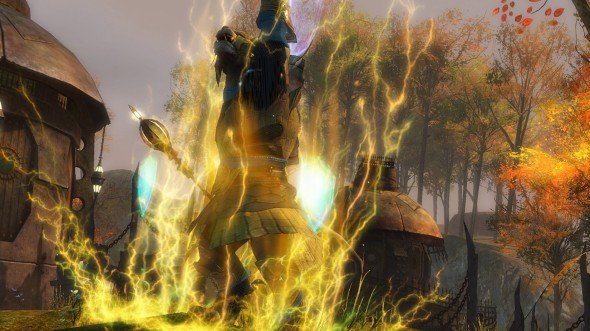
I was exploring a low-level forest when I came across a small village of trolls. The troll village was a problem, because they'd started to arm themselves with machinegun towers. An event started: disable the machineguns, and get this many reward points. Around me were four, maybe five other players, and they'd already pitched in. An elementalist was laying down fireballs and firewalls. A warrior was slicing and dicing trolls with his axe. At the back, I, as a ranger, swapped between bow and gun, firing and then retreating, weaving in and out of range.
The players fighting the machinegunners and trolls weren't formally grouped, but that didn't really matter. All of us gained credit for our kills and accomplishments, all of us received fair recompense for holding the line. By the time we'd disabled the three main towers, we'd started to develop tactics. Elementalists laying down walls of flame to light my arrows. Warriors spotting the incoming big hits and ducking behind their shield walls. The necromancer raising corpse after corpse to throw back at the attackers. It worked.
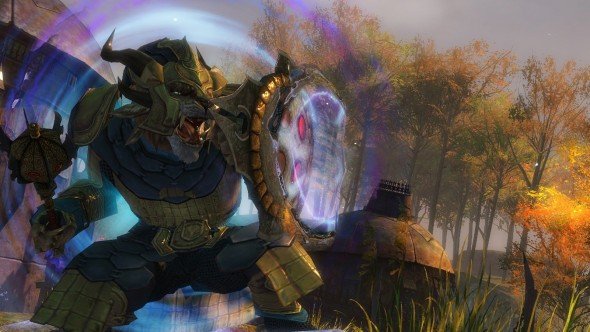
Group quests, public quests, rifts... what Guild Wars 2 is attempting with this event-based play isn't strictly new. Warhammer Online experimented with public quests years ago. In the recently released Rift, the rifts themselves offer the same smart ad-hoc grouping.
But none of these games commit so heavily to public shared events as Guild Wars 2. They're everywhere, cascading from one objective to the other. Arrive at a castle and you'll need to chase away occupying forces. Rout them, and you've got a minute to prepare for a counterattack – a timed event that sees you defending wave after wave of increasingly powerful invaders. Complete that, and it's off to attack the bads at the source, sneaking into their camps and demolishing siege engines and catapults, all with the same loose band of friends you made when you arrived.
The pace at which you get through objectives is surprising. As is the reward you feel from exploring, and then achieving. When playing Guild Wars, I never really felt breadcrumbed – I explored the world, and had experiences. I didn't bounce from exclam to exclam, searching for the next objective.
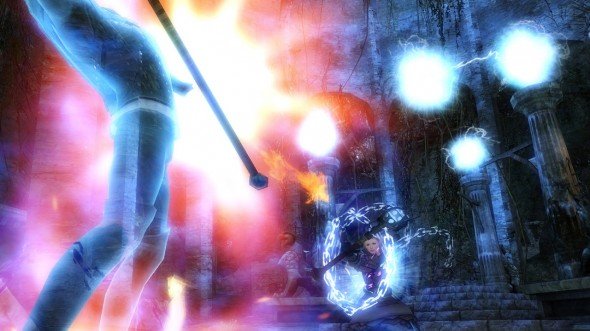
Sometimes that exploration landed me in trouble. Eventually I found myself facing a troublesome pirate, way out of the level range of the impromptu group I had formed to fight him. He smashed our faces off, again and again, and it took a developer to step in and help before we could progress any further.
ArenaNet's founder, Mike O'Brien, knows that devoting their overworld entirely to these events, rather than quests, is a risk. But, he says, it's a risk worth taking. “Starting this project, we spent some time thinking back to the dawn of MMO gaming, back to what we were all hoping MMOs would be. What we all hoped, and what everyone hopes today, is that MMOs are really a world, and that the things you do in that world have an impact. If you come across a town and the people are running around screaming 'the centaurs are attacking,' you want to see the centaurs attacking. You want to drive them back. You want to put out the fires. And then you want to help them rebuild the town. That's the starting vision for Guild Wars 2: let's make a world we all inhabit together.”
The payoff for this approach, Mike points out, is in making other games look stupid. “MMOs are supposed to be social games, yet too often everybody in an MMO is doing their own thing. There are the NPCs who you have to cure from being poisoned, but right after curing them, they lie back down to wait for someone else to bring them the antidote. There's the basics of kills: players not having the same motivation to cooperate, maybe stealing a kill and the associated loot and XP.”
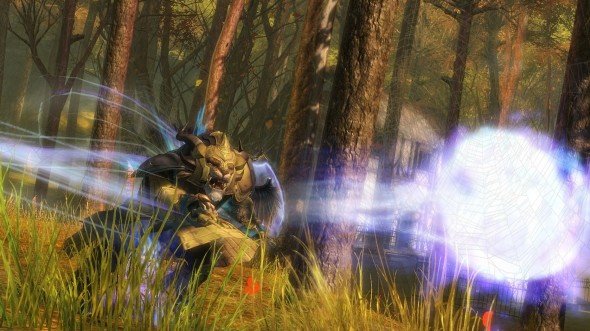
Mike talks a good talk. But one of the strange things about playing and enjoying games is that good arguments and strong design doesn't necessarily translate into fun. Our brains are rarely logical when it comes to how they are entertained. My chief objection to the original Guild Wars was that the game felt over-designed; that the combat, progression and social systems made sense for a designer, but rarely captured the imagination of players. Combat in Guild Wars 1 was about changing the rate in which your enemy's health decayed or recharged, distorting how quickly they refilled, killing through calculus. The combat system let players pick, mix and match 1,100 skills – but all of those skills relied on tedious text descriptions rather than letting players instinctively feel the impact they were having. And with free respecs and little gear progression, your character felt throwaway.
Guild Wars 2 fixes some of this. The combat system is interesting in itself – it's immediately far more physical, with animations that convey impact, knockbacks flying all over the place, and sound effects that carry a deeper bass crunch. There's no auto-attack, and combat is far more dynamic: most classes can swap weapon sets on the fly.
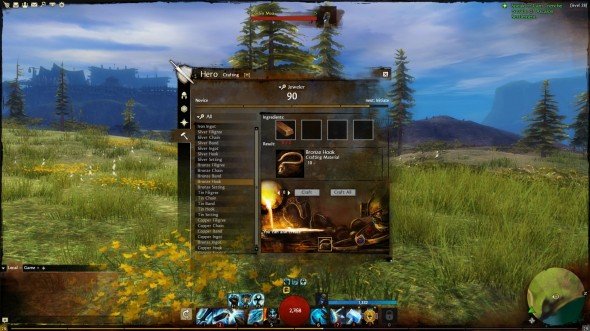
Each weapon set carries its own abilities. As a thief, I charged into fights with two swords, slicing and dicing, before landing a stun. Then I'd swap to two pistols and dance out of range, constantly shooting as they chased after me. It felt closer to a third-person action game than an EverQuest or World of Warcraft clone. Not quite Devil May Cry with persistent characters, but pretty close.
Character progression still relies on skills, but it's allied to the concept of a 'personal story'. When you create a character, you're offered roleplaying choices: do you pick the Ferocious trait, or Peaceful? These choices play into the dialogue and quests that you'll experience.
“We want Guild Wars 2 to be a really good RPG,” Mike says. “A great RPG in addition to being an MMO. We want your character to feel like they had a past, that they have aspirations. That they were more than just a profession and a race.”
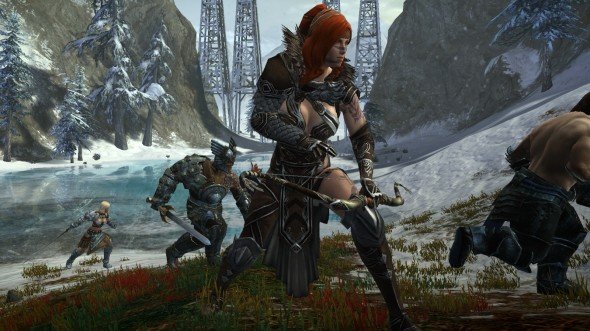
As a Norn, for example, [ shapeshifting warrior people – Lore Ed] what's most important is not your birth or societal class, but how much of a hero you are. The game asks you: “What qualities should a hero possess? Is it strength, cunning, or instinct? What animal do you most identify with? Bears? Leopards? Ravens?” Mike assures me that each choice will have a direct impact on your character's experiences. (The answer, by the way, is a cunning bear.)
The final risk ArenaNet are taking is financial. There's no doubt that they could charge a monthly subscription for Guild Wars 2 – this is as fully featured an MMO as World of Warcraft, Rift or The Old Republic. But they have chosen not to. Instead, ArenaNet are placing all their faith on players enjoying the game so much that they'll be willing to buy in-game items. And, I speculate, on them buying sidegrade expansion packs such as Guild Wars: Factions or Guild Wars: Prophecies released at a rapid pace.
“We sold around seven million copies of Guild Wars 1,” Mike says, “and have been really successful. You see a lot of people launch as a subscription MMO and discover that it's really hard to compete with WoW as a second subscription. We've seen it time and time again – you get to the end of your 30-day trial period and 'PSHOOOM'... your playerbase drops through the floor.”
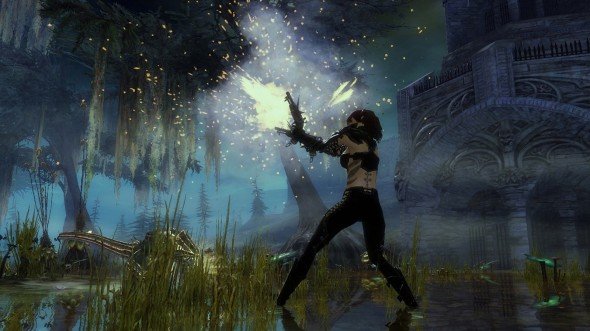
ArenaNet have still to show how their endgame will work, nor have they shown the PvP systems that will keep competitive players entertained (although it's easy to spot half the developers scrapping in GW2 arenas on a beta server during their lunchbreak). There's still a lot to come. A lot of risk. A lot of innovation. But GW2 already plays extremely well and I can't wait to come back to play more.
There's simply a lot to like.
Even if it all goes to pot, there's always the sheer beauty of Guild Wars 2's world. I take a moment to take in the gorgeous grasslands we've been fighting across. It is the most beautiful meadow I've ever battled in. Seriously.
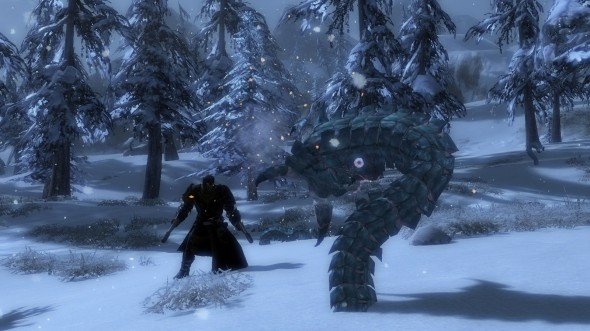
Mike is bullish on the potential of his game. “We can make the highest quality MMO ever released. We can be the number one MMO in the world. We don't have to settle. And we're not going to release this until it's done.”

